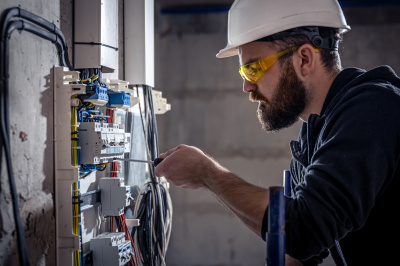What Is An Electrical Inspection?
An electrical installation's safety and condition are examined during an electrical inspection. They are often done as part of an annual safety inspection or when moving into a new house. To confirm that the property's wiring is up to code and lowers the risk of electrical-related mishaps, there are typically two types of inspection: a visual examination and a wire test. The visual examination looks at the electrical components and any potentially problematic elements that may be present, such as insulation, overloading, and loose connections. The wire test, which is often performed using a specialised electrical testing tool, is a more thorough investigation that will uncover any concealed problems or abnormalities.
A house or business building's electrical wiring has to be tested to ensure that it is completely up to code and operating correctly. This may entail testing for grounding and voltage problems as well as examining outlets, switches, and circuit breakers. During an electrical inspection, an inspector will evaluate the state of the electrical system visually. They will search for any evidence of wear, corrosion, or damage and look for any exposed or loose wires or connections.
The Importance Of Electrical Inspections
To ensure the security of your house or place of business, you must get an electrical home inspection. Inadequate or obsolete wiring systems that might cause a fire or other electrical problems are among the possible concerns that a safety assessment will find. A complete home electrical safety assessment helps reduce the danger of electrical fires, which are a serious possibility. By identifying any issues that might lead to future harm, an electrical safety check can help increase the lifespan of your electrical system. You may shield yourself and your family from potential harm by having a safety check done.
Electrical safety checks are a required precaution to make sure that your residence or place of business complies with all applicable regulations. A comprehensive examination of the electrical system is part of a domestic electrical inspection in order to spot any possible dangers or hazards, such as defective wiring, overloaded circuits, or loose connections. In order to accurately assess the state of the system's components, electricians will thoroughly inspect each one, from outlets and switches to breaker boxes and wires. They can assess whether everything is working correctly through this thorough inspection, allowing you to feel secure about the safety of your property.

Need assistance finding electrical inspections near you?
Get a QuoteHow Often Is An Inspection Required?
A thorough electrical examination must be performed at least every five years. This is especially crucial if the property has recently undergone renovations or additions since these might pose safety risks. Every five years or whenever a new tenant moves in, rental properties need typically undergo an examination.
Every five years, a house or company should have an electrical safety examination performed. If you are purchasing a new house or having renovations done, it is also crucial to have an inspection performed. This will assist in ensuring that your wiring system complies with regulations and is secure for you and your family. You can protect your house from potential electrical risks by having a domestic electrical inspection done.
Are Electrical Inspections A Legal Requirement?
Most landlords take the initiative to ensure the security of their occupants, which is a good addition to the housing market. But a small percentage don't, endangering their renters as a result. According to these new regulations, landlords must arrange for experienced and competent individuals to assess and test the electrical equipment in their homes at least once every five years. A copy of the electrical safety report must be given by landlords to renters and, upon request, the local government.
As a result, all landlords must now ensure that the electrical installations in their rental buildings are secure, as good landlords already do. The Regulations went into effect on June 1, 2020, as part of a larger effort by the Department to increase safety in all home settings, but especially in the private rental sector. This is a significant step towards raising the standard of the private rental sector and ensuring that it will provide high-quality, secure accommodation. This is the housing that our nation needs, together with the social and owner-occupied sectors.
Benefits Of Electrical Inspections
An electrical examination not only satisfies regulatory requirements but also safeguards occupants' safety. Additionally, it helps guard against the need for costly repairs in the event of an undiscovered malfunction. Regular inspections extend the life of appliances by allowing for early detection of wire degradation and the implementation of preventative actions. These tests can frequently assist in improving the home's energy efficiency and operating costs.
System failure is never a good thing. However, an electrical safety check will assist you in preventing any issues with your electronics that could develop as a consequence of poor maintenance. If you have poor wiring, electronics like your laptops and appliances may get harmed. Plan an electrical examination to avoid it. An electrical safety assessment might ultimately help you save money. An examination will assist you in spotting potential problems before they develop into significant (and costly) difficulties. For instance, if your electrical system is malfunctioning, broken cables may ignite and start fires, and your devices may stop working. You might have to pay more for these products.
Last but not least, having a routine electrical inspection and test may reassure homeowners that their electrics are in good shape and, more significantly, safe. It is worthwhile to invest in a routine inspection to safeguard you, your family, and your house against electrical-related fires because they may be quite harmful.
In this article:
